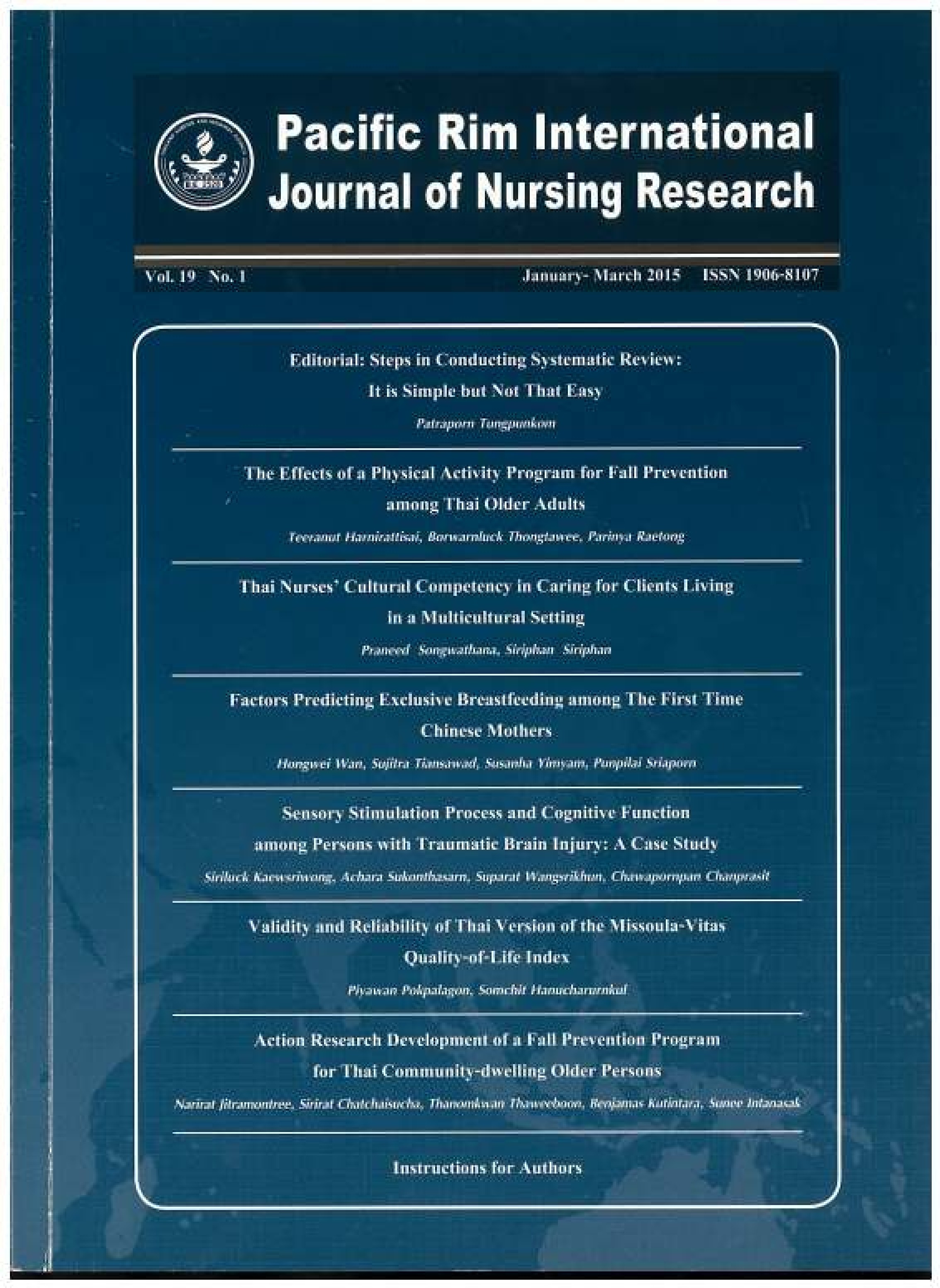Thai Nurses’ Cultural Competency in Caring for Clients Living in a Multicultural Setting
Keywords:
cultural competency, Cultural skill and Knowledge, Multicultural; Nursing, ThailandAbstract
The three southernmost provinces of Thailand are recognized as areas with a variety of cultural contexts. It is therefore essential for nurses to have cultural competency to respond to different health care needs. The purpose of this descriptive research was to assess the level of Thai nurses’ cultural competency in caring for clients living in a multicultural setting. A self-report questionnaire on cultural competency was administered to 126 registered nurses working around the southern Thai-Malaysian border region, who were recruited from provincial hospitals, community hospitals and local health centers. The questionnaire was composed of five dimensions: cultural knowledge,cultural awareness, cultural skills, cultural encounters and cultural desire. The cultural knowledge dimension was tested for internal consistency using Kruder-Richardson (KR-20), yielding a value of 0.72. The other 4 dimensions were tested using Cronbach’s alpha coefficients, yielding a total value of 0.84. Descriptive statistics were used for data analysis.
The results revealed that the nurses’ overall cultural competency was at a moderate level. Cultural awareness, cultural encounters and cultural desire were at a high level, but cultural knowledge and cultural skill were at a moderate level. No significant differences were found according to period of working, health-care setting or training experience about multicultural care, but differences were found across religion (p<.05). The findings highlight the importance of cultural competency development among Thai nurses aimed at reducing stress and conflicts, and promoting nurses’ adaptation when working in the multicultural settings of the Thai-Malaysian border region.
References
2.Thailand Burma Border Consortium. Camp population. [Cited 2013 June 1]; Available from https://www.tbbc.
org/camps/population.ht.
3. Pongsapich A. Cultural diversity (Paradigm and the role of civil society). Bangkok: Chulalongkorn University. 2004.
[in Thai]
4. Sombat K, Piriyanuphong, N, Artnarong, S. Local wisdom of self-care behaviors among Thai Muslim population
living in southern Thai provinces. [Research report].Yala: Yala Smart ; 2003. [in Thai]
5. Songwathana P, Hiruanchunha S, Sangchan H. Petpichetchian W, Kampalikit S. Development a Nursing Curriculum for Improvement of Cultural Skills and Competence for Nursing Students. Unpublished research report. Faculty of
Nursing, Prince of Songkla University; 2009. [in Thai]
6. Madeline, M-L.Transcultural nursing: its important in nursing practice. Journal Cultural Diversity. 2008 15(1): 37-43.
7. Gallagher, RW. A Meta-Analysis of Cultural Competence Education in Professional Nurses and Nursing Students. A
doctoral dissertation, College of Nursing, University of South Florida, 2011.
8. Songwathana P. Transcultural nursing research: concept and experience. Proceeding in National Nursing Conference host by Thailand Nursing and Midwifery Council, Bangkok: Miracle Grand Hotel 2-4 December 2013. [in Thai]
9. Jitmoud S. Islamic Culture. 3rd ed. Bangkok: Thangnum;1992. [in Thai]
10. Campinha-Bacote, J. A model and instrument for addressing cultural competence in health care. J Nurs Edu.
1999 38: 203-7.
11. Bond ML, Kardong-Edgren,S, Jones ME. Assessment of Professional Nursing Students’ Knowledge and Attitudes about Patients of Diverse Cultures. J Prof Nurs. 2001 17, 305-312.
12. Bangroy S. Psychiatric Nurses’ Caring Competencies Based on Religious Belief of Muslim Schizophrenia Patients in Psychiatric Hospitals, Southern Thailand. A Master Thesis of Nursing Science, Faculty of Nursing, Prince of Songkla University; 2008. [in Thai]
13. Dumkeang J. Spiritual care for Muslim elders as valued and perceived by nurses and hospitalized Muslim elders.
A Master Thesis of Nursing Science, Faculty of Nursing, Prince of Songkla University; 2005. [in Thai]
14. Wong-Anutarohd P. Psychology of Personnel Management. Bangkok: Pimdee Co.Ltd; 2001.
15. Vasalaemae L. Synergy Habit among Head Nurses and Nurses in Community Hospitals under the Unrest Situation
in the Three Border Provinces, Southern Thailand. A Master Thesis of Nursing Science, Faculty of Nursing,
Prince of Songkla University ; 2008. [in Thai]
16. Campinha-Bacote J. The process of cultural competence in the delivery of health care services: A model of care. J
Transcul Nurs. 2002 13(3): 181-184.
17. Shingchangchai P, Khampalikit S, NasaeT. Nursing Research: Principle and Process. Songkla: Tameprint; 1996.
18. Petpichetchian W, Songwathana P, Hiruanchunha S,Sangchan H. The development of assessment tool regarding cultural skills and competence for Thai nursing students. Unpublished research report. Faculty of Nursing, Prince of Songkla University; 2007. [in Thai]
19. Saisamut M. Adversity Quotient of Head Nurses and Staff Nurses in Community Hospitals in the Three Border
Provinces, Southern Thailand. A Master Thesis of Nursing Science, Faculty of Nursing, Prince of Songkla University;
2008. [in Thai]
20.Beach MC, Price EC, Gary TL, Robinson KA, Gozu A, Palacio A, Smarth C, et al. Cultural Competency: A
Systematic Review of Health Care Provider Educational Interventions. Med Care. 2005 43(4): 356-73.
21. Soh-Aree F. Cultural Competency of Head Nurses in Community Hospitals in the Three Southernmost Provinces,
Thailand. A Master Thesis of Nursing Science, Faculty of Nursing, Prince of Songkla University; 2009. [in Thai]
22. Promsaad K. Nurses’ cultural competency in health care services in a multicultural setting in three southern Thai border provinces. A Master Thesis of Nursing Science, Faculty of Nursing, Prince of Songkla University; 2010. [in Thai]
23. Hirunchunha S, Sangchan H, Songwathana P, Petpichetchian W. Perception of Thai Nursing Students and Faculty’s Competence toward Caring for Culturally Diverse Clients.Thai J Nurs Council. 2009 24(1): 99-111.
24. Association of Southeast Asian Nations ASEAN Mutual Recognition Arrangement on Nursing Services[Cited
2010 October 31] Available from https://www.asean.org/communities/asean-economic-community/item/asean-mutual-recognition-arrangement-on-nursing-services
Downloads
Published
How to Cite
Issue
Section
License
Copyright: The Pacific Rim International Journal of Nursing Research, Thailand Nursing & Midwifery Council has exclusive rights to publish, reproduce and distribute the manuscript and all contents therein.








.png)



